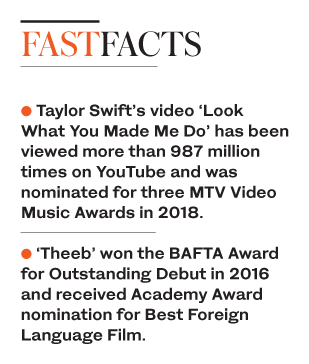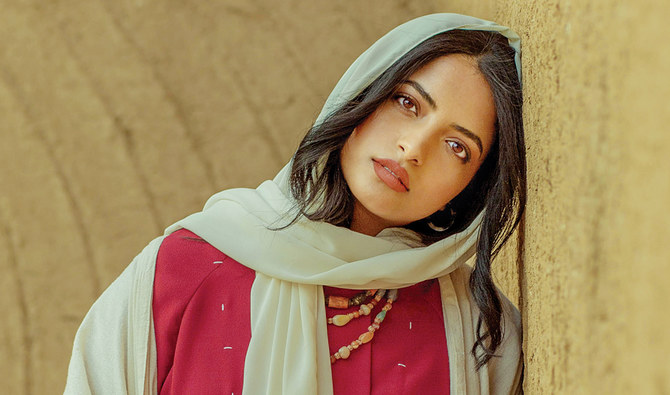JEDDAH: Saudi film producer Jumanah Shaheen is reaching for the stars.
Born and raised in Jeddah, the young visual and animation expert has found herself rubbing shoulders with some of the biggest names in the entertainment world, including the likes of Taylor Swift and Maroon 5.
And despite a relatively short career in the movie industry, ambitious Shaheen has already set her sights on running her own content creation house on the lines of Disney and Pixar.
Shaheen grew up moving between the US and Saudi Arabia, giving her a good understanding of different cultures from an early age.
After completing high school in Jeddah, she moved to the US in 2010 and obtained a bachelor’s degree in animation and visual effects from the Academy of Art University, in San Francisco. After graduating in 2015, she moved to Los Angeles, where she currently resides, to advance her professional career.
Shifting between countries and cultures meant Shaheen often struggled to fit in, but she noticed that the one common interest she had with many people was her passion for movies, animations and various characters. “This was always my way of formulating relationships with those around me,” she said.
 Watching movies was also how she entertained herself. “From an early age I loved writing, drawing and re-enacting different movie scenes. I would also imagine myself as one of the characters in my favorite movies.”
Watching movies was also how she entertained herself. “From an early age I loved writing, drawing and re-enacting different movie scenes. I would also imagine myself as one of the characters in my favorite movies.”
Shaheen was always fascinated by the messages behind films. Through watching television, she learned not to judge others for their actions but rather to search for the reasons behind those actions. She said: “Rather than debating about which movies were better and picking favorites, I felt that every movie served its own purpose.”
She chose her field of study to act as a vehicle for sending out positive messages.
“If I were to do something good in this world and have a positive influence, it would most likely be by sending a message of having a little empathy when dealing with others and try to understand where they might be coming from before judging them. I feel that movies and animation, with the right message, can have a much bigger impact than other mediums,” added Shaheen.
As a visual effects (VFX) producer, Shaheen meets with clients to establish what effects are needed, assess footage, determine how many artists are required for a project, and communicate thoughts back to the client. “I also have to orchestrate what is being done, to make sure that the work is done efficiently while sticking to the time frame and budget.”
Hiring the correct talent is also key. “Each illustrator, for example, has their own style, so I have to make sure that the style fits the project that I am working on.”
In addition, Shaheen maintains constant communication between the production team and client. Developing a strong relationship with the client and artists was vital to achieving a project’s desired outcome, she said.
“I prefer to have a relationship with the artists where we can talk about the project and include them in every step, because at the end of the day if the client decides to change the concept, which the artist spent time and effort working on, they might not feel as frustrated.”
Shaheen said that having a strong technical background and being creative, were key attributes to success in her field. It was also important to keep up to date with industry advances. Shaheen does this by taking courses, volunteering for various projects and checking out different forums online. She also attends seminars and art exhibitions in order to “stay inspired.”
Depending on a project’s budget, level of quality, resolution and extent of visual effects, the production team can be as small as three people or as large as 400.
Shaheen described the technical process as Photoshop for video. But unlike with still images, the movement of objects have to be tracked to make the video look seamless. This means many calculations, math and physics.
“It’s not as simple as copying and pasting because it has to look realistic,” said Shaheen. “Even for something as simple as a walk, you have to realize that there is more than one joint moving, so it does take time to create it and make it look real.”
Shaheen has a long list of contributions to well-known and award-winning productions including feature films such as the Oscar-nominated Arabic movie “Theeb,” drama “Fruitvale Station,” “Captain America: Civil War,” and “Advantageous.”
She also worked on popular TV series such as “Modern Family,” “Fresh Off the Boat,” “Black-ish,” and “Arrested Development.”
Her music videos have included work for internationally famous artists such as Taylor Swift’s “Look What You Made Me Do,” and Maroon 5’s “Three Little Birds.”
Swift’s video was one of Shaheen’s more challenging projects. “It was my chance to prove myself because I had just been promoted from coordinator to producer. At the same time, it was a big project with a team of only 30 people working on it.”
She said she had to take on the roles of producer, coordinator, personal assistant, and runner, and worked long hours, six days a week for the duration of the project. “The stress of this project also meant that I got to build a much stronger relationship with the artists that I was working with, who were very supportive.”
During her recent visit to Saudi, Shaheen was pleased to see the positive changes taking place in the Kingdom’s film industry. She believes Saudi Arabia has a lot of talent and stories to share.
She noted that Saudi films such as “Wadjda” were proof of the talent in the country, in addition to other short films and songs by local artists she found to be very creative.
“I think that these short films can someday turn into feature films and these songs can become soundtracks to these films. it’s just a matter of giving them the opportunity and space to creatively convey their ideas and to express themselves.”
Shaheen feels there is still room for improvement and space to grow for the industry.
“For example, there are still no clear guidelines as to what we can and cannot do. We definitely do have the resources to compete with the movie industries abroad, but it’s just a matter of being daring enough to take the step,” she added.
Looking ahead, Shaheen would like to set up her own production house but not the kind that would provide services and take on commercial projects. “I would like to have my own content creation house working with in-house scriptwriters and concept artists, kind of how Disney and Pixar started.”
For anyone thinking of entering the industry, Shaheen said it was important to take every small opportunity and turn it into something big.
“My first job was to hold a door open on set for eight hours. It was tedious but I got to see the different people walking in and out such as producers, and directors. Eventually, when one of the assistant directors called in sick, I was able to move from a personal assistant to assistant director.”






























